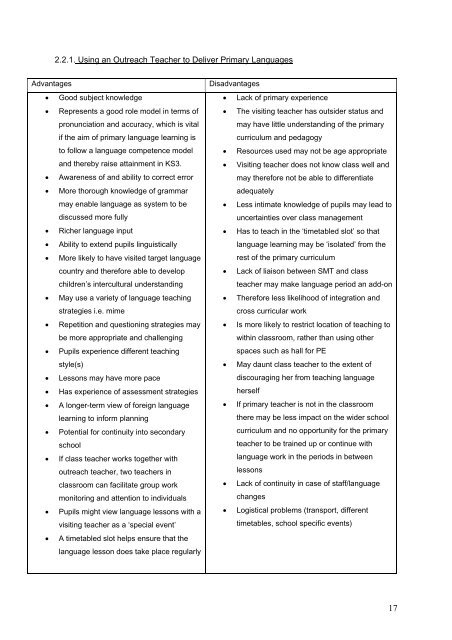Evaluation of the Key Stage 2 Language Learning Pathfinders
Evaluation of the Key Stage 2 Language Learning Pathfinders
Evaluation of the Key Stage 2 Language Learning Pathfinders
Create successful ePaper yourself
Turn your PDF publications into a flip-book with our unique Google optimized e-Paper software.
2.2.1. Using an Outreach Teacher to Deliver Primary <strong>Language</strong>sAdvantages• Good subject knowledge• Represents a good role model in terms <strong>of</strong>pronunciation and accuracy, which is vitalif <strong>the</strong> aim <strong>of</strong> primary language learning isto follow a language competence modeland <strong>the</strong>reby raise attainment in KS3.• Awareness <strong>of</strong> and ability to correct error• More thorough knowledge <strong>of</strong> grammarmay enable language as system to bediscussed more fully• Richer language input• Ability to extend pupils linguistically• More likely to have visited target languagecountry and <strong>the</strong>refore able to developchildren’s intercultural understanding• May use a variety <strong>of</strong> language teachingstrategies i.e. mime• Repetition and questioning strategies maybe more appropriate and challenging• Pupils experience different teachingstyle(s)• Lessons may have more pace• Has experience <strong>of</strong> assessment strategies• A longer-term view <strong>of</strong> foreign languagelearning to inform planning• Potential for continuity into secondaryschool• If class teacher works toge<strong>the</strong>r withoutreach teacher, two teachers inclassroom can facilitate group workmonitoring and attention to individuals• Pupils might view language lessons with avisiting teacher as a ‘special event’• A timetabled slot helps ensure that <strong>the</strong>language lesson does take place regularlyDisadvantages• Lack <strong>of</strong> primary experience• The visiting teacher has outsider status andmay have little understanding <strong>of</strong> <strong>the</strong> primarycurriculum and pedagogy• Resources used may not be age appropriate• Visiting teacher does not know class well andmay <strong>the</strong>refore not be able to differentiateadequately• Less intimate knowledge <strong>of</strong> pupils may lead touncertainties over class management• Has to teach in <strong>the</strong> ‘timetabled slot’ so thatlanguage learning may be ‘isolated’ from <strong>the</strong>rest <strong>of</strong> <strong>the</strong> primary curriculum• Lack <strong>of</strong> liaison between SMT and classteacher may make language period an add-on• Therefore less likelihood <strong>of</strong> integration andcross curricular work• Is more likely to restrict location <strong>of</strong> teaching towithin classroom, ra<strong>the</strong>r than using o<strong>the</strong>rspaces such as hall for PE• May daunt class teacher to <strong>the</strong> extent <strong>of</strong>discouraging her from teaching languageherself• If primary teacher is not in <strong>the</strong> classroom<strong>the</strong>re may be less impact on <strong>the</strong> wider schoolcurriculum and no opportunity for <strong>the</strong> primaryteacher to be trained up or continue withlanguage work in <strong>the</strong> periods in betweenlessons• Lack <strong>of</strong> continuity in case <strong>of</strong> staff/languagechanges• Logistical problems (transport, differenttimetables, school specific events)17

















